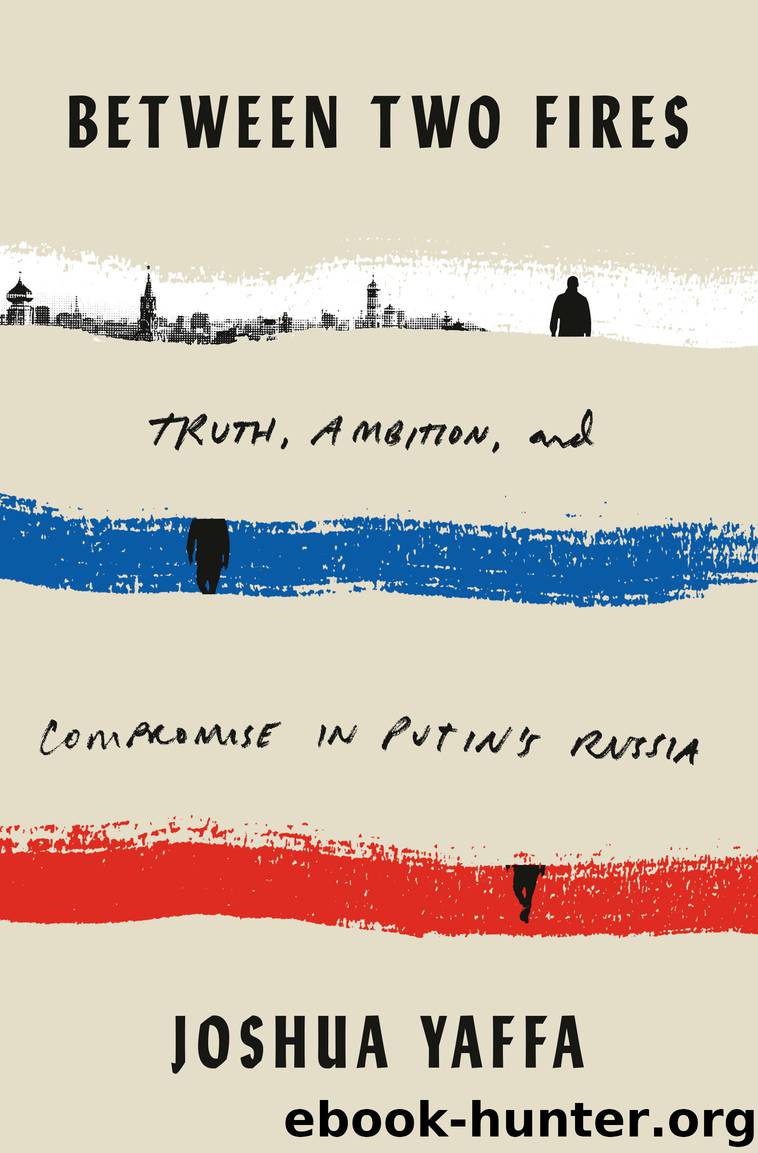Between Two Fires by Joshua Yaffa

Author:Joshua Yaffa
Language: eng
Format: epub
Publisher: Crown/Archetype
Published: 2020-01-13T16:00:00+00:00
* * *
—
TWO DAYS AFTER THE vote, Putin gathered Russia’s political elite in the Kremlin’s Saint George Hall to announce Crimea’s formal annexation. He cited the peninsula’s historic ties to Russia and Khrushchev’s error in transferring it to Ukraine in the first place. “In people’s hearts and minds, Crimea has always been an inseparable part of Russia,” he declared, recalling its role as the baptismal site of Vladimir the Great, the first Russian tsar to adopt Orthodoxy. He was interrupted every few seconds by applause from an audience of rapturous supplicants: government ministers, parliamentary deputies, regional governors. He spoke to the fears of people in Crimea like Zubkov, who were convinced by the fog of propaganda and rumor that Fascists had been on the march to do them harm, until Russia came to protect them, saving them, as Putin said, from the “intentions of these ideological heirs of Bandera, Hitler’s accomplice during World War Two.”
Putin’s speech, more a source document outlining the rules and motifs that would govern his presidency going forward than it was anything to do with Crimea, was laced with equal parts grievance and triumph. He was furious, but, in delivering Crimea, satisfied and proud at the spoils he had brought home: at long last he exacted a measure of historical revenge for the injustices suffered by Russia in the years since the Soviet collapse. “If you compress a spring all the way to its limit, it will snap back hard,” he said. In the days that followed, Putin’s public approval reached an all-time high of 86 percent. He had spoken to the confusion and frustrations of a whole country, for which Crimea functioned as a mass psychological remedy. Oleg and Oksana told each other how good it felt to sleep under peaceful skies, citizens once again of a great and mighty state.
Zubkov’s enthusiasm continued even as Crimea became an international no-go zone, where no Western banks or firms would conduct business. Sanctions meant that even large Russian companies were afraid to maintain a presence in Crimea, lest their global operations come under threat. In those early days, it was impossible to withdraw cash from a bank machine or pay suppliers outside Crimea. Zubkov kept Taigan’s funds in a Ukrainian bank, which, after annexation, blocked access for clients in Crimea. Zubkov could not buy the meat required to feed the park’s animals: his lions and tigers consume a total of a thousand pounds of meat every day. With his funds frozen, and Taigan’s animals beginning to go hungry, Zubkov slaughtered pigs and goats from the park’s small farm. But the Kremlin was making big promises, earmarking $7 billion for Crimea in 2014 alone and forecasting that three million Russian tourists would visit Crimea that year. Zubkov felt part of a historic process. “We were trying to achieve something, we had big ambitions, and I was inspired by all the new possibilities,” he told me.
Six months after Crimea’s annexation, Zubkov decided to run for a seat as a deputy in Crimea’s regional parliament.
Download
This site does not store any files on its server. We only index and link to content provided by other sites. Please contact the content providers to delete copyright contents if any and email us, we'll remove relevant links or contents immediately.
| Arms Control | Diplomacy |
| Security | Trades & Tariffs |
| Treaties | African |
| Asian | Australian & Oceanian |
| Canadian | Caribbean & Latin American |
| European | Middle Eastern |
| Russian & Former Soviet Union |
The Secret History by Donna Tartt(19088)
The Social Justice Warrior Handbook by Lisa De Pasquale(12190)
Thirteen Reasons Why by Jay Asher(8909)
This Is How You Lose Her by Junot Diaz(6887)
Weapons of Math Destruction by Cathy O'Neil(6279)
Zero to One by Peter Thiel(5802)
Beartown by Fredrik Backman(5754)
The Myth of the Strong Leader by Archie Brown(5507)
The Fire Next Time by James Baldwin(5444)
How Democracies Die by Steven Levitsky & Daniel Ziblatt(5218)
Promise Me, Dad by Joe Biden(5153)
Stone's Rules by Roger Stone(5088)
A Higher Loyalty: Truth, Lies, and Leadership by James Comey(4964)
100 Deadly Skills by Clint Emerson(4925)
Rise and Kill First by Ronen Bergman(4789)
Secrecy World by Jake Bernstein(4753)
The David Icke Guide to the Global Conspiracy (and how to end it) by David Icke(4718)
The Farm by Tom Rob Smith(4509)
The Doomsday Machine by Daniel Ellsberg(4490)
